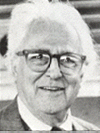 |
| What's New > Karl Shapiro |
 Karl Shapiro: 1913-2000 Karl Shapiro assumed the editorship of Prairie Schooner in late 1956, succeeding founder Lowry Wimberly. Shapiro's credentials were impressive. He'd been awarded the Pulitzer and Bollingen prizes, had served as Poetry Consultant at the Library of Congress, and had edited Poetry Magazine. He was the most highly celebrated poet ever to be a member of the faculty of any university on the western plains, and he continues to hold that distinction nearly fifty years later. In the first issue he edited he wrote, "Almost everything worth saying has been said about the ‘little magazine.' It is a deficit publication with a circulation too small to explain its existence; what it prints has no public appeal, although most of the finest modern authors have been brought to light by this unique medium of publication." During the next six years he was to solicit and publish work by many of the twentieth century's literary giants: Kay Boyle, Edward Dahlberg, Richard Eberhart, Leslie Fiedler, Isabella Gardner, Josephine Jacobsen, Randall Jarrell, Hugh Kenner, Josephine Miles, John F. Nims, Octavio Paz, and William Carlos Williams. He reinstated book reviews, changed the look of the magazine, and wrote an annual critical chronicle of new volumes of verse. The two dozen issues of those years maintain their energy and vitality. The last issue he was to prepare was introduced by Randall Jarrell's "Fifty Years of American Poetry," an important essay by a master of criticism. He withdrew his name from the masthead for the Spring 1963 issue when university administrators blocked publication of a short story he had accepted. The story, which explicitly described two heterosexual love scenes, was said to be "obscene and in poor taste." Shapiro called the censorship a "provincial atrocity" and declared that no self-respecting author would submit to a magazine in the hands of censors. Having failed to turn the minds of the authorities, he resigned as editor. He continued to teach at the University of Nebraska for the next three years, and then accepted a position at the University of Chicago. Though he did not succeed against his censors, he succeeded as an editor. He nudged Prairie Schooner from its position as a regional journal and transformed it into a national literary phenomenon that readers all across the country began to follow with interest and excitement. We go forward guided by his brilliance and integrity. For more information on Karl Shapiro's life and work, please check out the Karl Shapiro website hosted by the Stadler Poetry Center, Bucknell University. |